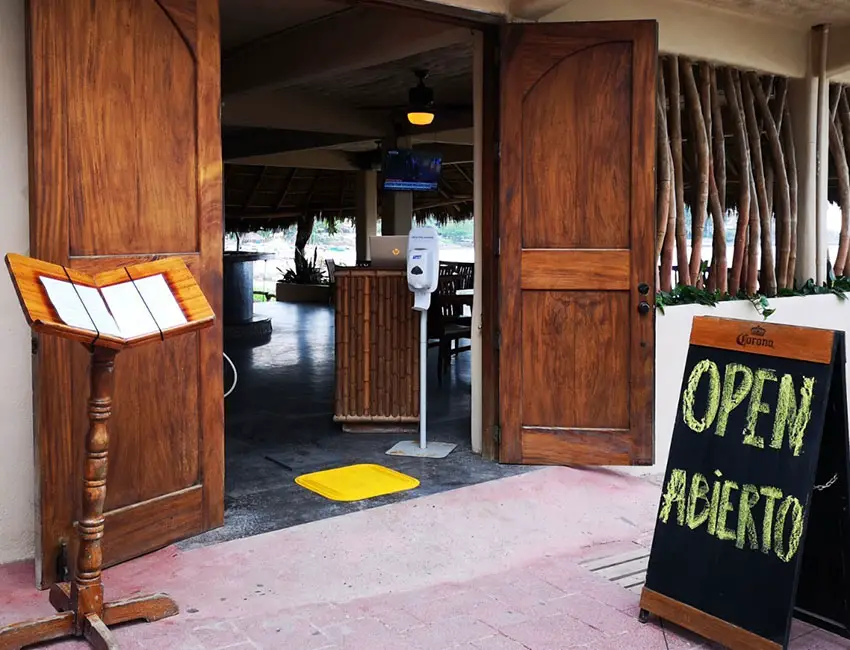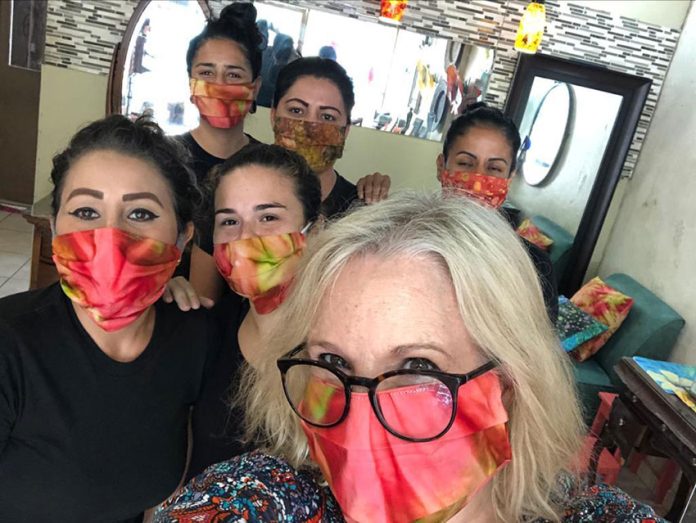In Mexico City, Bridget Rutherford watched with alarm as the coronavirus spread from China to Europe and beyond.
A native Australian, she and her Mexican-born husband opened the first of 14 hair removal salons in 2011; now Wax Revolution has 130 employees and thousands of customers spread throughout Mexico City, Querétaro and Puebla.
“I knew this was going to come to Mexico,” she said. “I started preparing in January.”
In mid-March Mexico City closed down. The couple negotiated discounted rents and continued to pay staff to “sit at home,” although some kept working, setting up pre-paid future appointments. “Everyone was hurting,” said Rutherford.
Official estimates say half a million formal businesses in Mexico could close in the next six months, with unknown numbers of casual workers and small family-run businesses affected. Without any kind of unemployment benefits — neither the federal nor local governments in Mexico provide this — what will these people do?
“There’s no safety net for them,” said Deborah Rodriguez, who started a GoFundMe campaign to pay her staff at Tippy Toes Salon in Mazatlán during what she calls “an unimaginable worst-case scenario.” Regular customers bought gift certificates or donated, as well as “random people from around the world,” she said.
But taking care of employees was just one piece of the unfolding crisis for business owners. Even as the Mexican president downplayed the pandemic and claimed the country was “morally protected,” they tried to prepare for an eventual re-opening. And now, after almost four months of no income, for many that time has come — albeit with a tangled web of new regulations and protocols that vary by city, state and type of business.
Rutherford found Australia’s protocols online, adjusted them for her business and then translated them into “10 Mandamientos de Higiene” (“10 health commandments”), which are part of the new training all her employees received. Rodriguez made changes in her salon, using recommendations from the U.S. Professional Beauty Industry, including reupholstering seating with wipeable vinyl and installing plexiglass barriers. She also had her employees certified in Covid-19 training by salons provider Barbicide.
“Your health, my health and my staff’s health is the most important thing right now, and I want people to feel they can come to Tippy Toes with confidence,” said Rodriguez in Mazatlán. “If it can’t be washed, dipped or sprayed with Barbicide, or be disinfected with extreme heat, then we consider it a single-use item and will throw it away. That’s our guarantee of cleanliness.”
Rodriguez even hired a consultant to make sure she was in compliance with the 30 pages of regulations that arrived by email before the city reopened on July 1. Precautions begin with a sanitation mat at the door filled with disinfectant to clean shoes; temperatures are checked, everyone must wear a face mask; hand sanitizer is mandatory. Rodriguez uses a disinfectant mister to clean rooms between clients; Rutherford, whose staff is 99% registered nurses, said they’d already been using many of these standards before the pandemic hit.
“A lot of Covid precautions are medical standards we’re taught — wiping everything down with medical grade disinfectant, always using clean sheets, thorough hand-washing — so all that, I was already doing,” said Mexico City acupuncturist Megan Maclaggan. Now she wears a mask and a shield, takes patients’ temperatures, and changes not just her mask but her clothes between each patient.

“The only way we can get back to normal is if there is no spread of the disease,” said Rutherford. All staff received extensive training during the shutdown, not just about the salon’s new protocols, but about what also had to be done in their personal lives. For example, if anyone has contact with a Covid-positive person, they’re given two weeks off with pay.
“I want that Covid disappears from our planet! The only way to do it is to limit contagion,” Rutherford explained. “If everyone does all these things, it is possible to limit the transmission. Then we can all go back to life as we know it. It’s not about the individual, it’s about all of us.”
Despite government reports claiming the situation is improving, Mexico has the fourth highest death toll of any country, with more than 40,000 new cases last week, and nearly 300,000 confirmed cases as of Sunday. Government health officials repeatedly warn that the numbers may actually be higher, and some states are considering shutting down again. Yet Mexico has opened for tourism and is promoting heavily.
In Sayulita, where tour buses arrive daily and disgorge hundreds of passengers for “a day at the beach,” restaurant owner Damian Porter said he’s trying to “hold the line” in terms of health protocols, using the state’s mandates as well as his own guidelines.
Unlike Puerto Vallarta in neighboring Jalisco, beaches in Nayarit are still officially closed – although there’s little or no enforcement and vendors and tourists crowd the sand. Businesses are supposed to allow only certain percentages of capacity, yet again nothing is being enforced and most bars, shops and restaurants are packed.
“It’s hard to enforce — I get it,” said Porter, whose Don Pedro’s Restaurant & Bar is one of Sayulita’s oldest and most popular restaurants. After furloughing 60 employees with pay for three months and starting a take-out/delivery service, reopening is a mixed bag. He’s had to close the restaurant’s beach entrance and take away tables on the sand, even while others continue to operate fully.
“Unfortunately, everyone’s chasing the dollar. Hopefully people understand our position, and that we’re doing the best we can for our staff.”
Don Pedro’s has put in place all the familiar measures: social distancing for tables, masks for all, automated disinfectant dispensers, sanitizer mats. They’re operating at 50% capacity, and tables are disinfected between customers. Staff and customers get their temperatures taken and any employee with signs of sickness is not allowed to work.
Yet all these precautions are for naught if people don’t comply by wearing masks and following social distancing guidelines. Tourists, visiting somewhere for a long weekend, are often unwilling to “spoil” their vacation by following basic protocols. And in Mexico and around the world, younger people especially don’t seem worried about catching — or spreading — the coronavirus.
“My obligation is to take care of my staff,” said Porter. “A lot of them live in multi-generational households. I try to explain to them that this is what happened in Italy and Spain.”
In Mexico City, Rutherford said they’ve had the occasional client who’s a “Covid-denier,” but they’re not allowed in the salon if they don’t wear a mask.
“They prefer to have the service than not,” she said. “And if they post on social media, that’s just fine. It won’t hurt us — quite the contrary! Our clients are happy about our measures, and they feel safe about coming back.”
Despite all these concerns, businesses all over Mexico are opening and people are eager to return to shopping, eating out or getting their hair cut.
“There’s a moment of ‘normal’ for people when they come in to the salon,” said Rodriguez. “They get a pedicure or a haircut, and they feel good. For just a moment they’re not in the Covid world.”
Mexico News Daily
